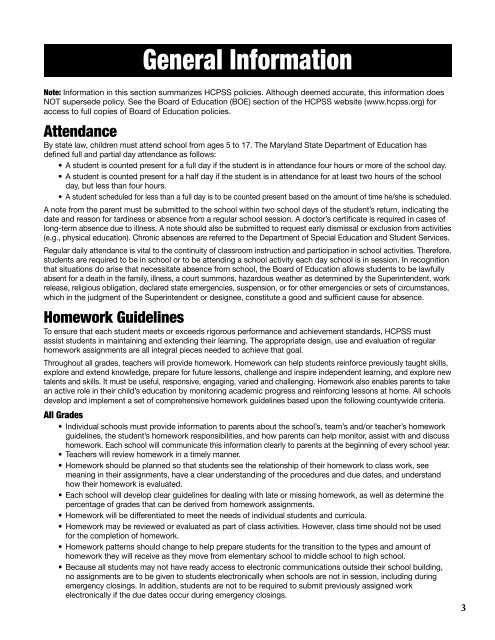Catalog of Approved Middle School Courses
ms-catalog-2017-18
ms-catalog-2017-18
You also want an ePaper? Increase the reach of your titles
YUMPU automatically turns print PDFs into web optimized ePapers that Google loves.
General Information<br />
Note: Information in this section summarizes HCPSS policies. Although deemed accurate, this information does<br />
NOT supersede policy. See the Board <strong>of</strong> Education (BOE) section <strong>of</strong> the HCPSS website (www.hcpss.org) for<br />
access to full copies <strong>of</strong> Board <strong>of</strong> Education policies.<br />
Attendance<br />
By state law, children must attend school from ages 5 to 17. The Maryland State Department <strong>of</strong> Education has<br />
defined full and partial day attendance as follows:<br />
• A student is counted present for a full day if the student is in attendance four hours or more <strong>of</strong> the school day.<br />
• A student is counted present for a half day if the student is in attendance for at least two hours <strong>of</strong> the school<br />
day, but less than four hours.<br />
• A student scheduled for less than a full day is to be counted present based on the amount <strong>of</strong> time he/she is scheduled.<br />
A note from the parent must be submitted to the school within two school days <strong>of</strong> the student’s return, indicating the<br />
date and reason for tardiness or absence from a regular school session. A doctor’s certificate is required in cases <strong>of</strong><br />
long-term absence due to illness. A note should also be submitted to request early dismissal or exclusion from activities<br />
(e.g., physical education). Chronic absences are referred to the Department <strong>of</strong> Special Education and Student Services.<br />
Regular daily attendance is vital to the continuity <strong>of</strong> classroom instruction and participation in school activities. Therefore,<br />
students are required to be in school or to be attending a school activity each day school is in session. In recognition<br />
that situations do arise that necessitate absence from school, the Board <strong>of</strong> Education allows students to be lawfully<br />
absent for a death in the family, illness, a court summons, hazardous weather as determined by the Superintendent, work<br />
release, religious obligation, declared state emergencies, suspension, or for other emergencies or sets <strong>of</strong> circumstances,<br />
which in the judgment <strong>of</strong> the Superintendent or designee, constitute a good and sufficient cause for absence.<br />
Homework Guidelines<br />
To ensure that each student meets or exceeds rigorous performance and achievement standards, HCPSS must<br />
assist students in maintaining and extending their learning. The appropriate design, use and evaluation <strong>of</strong> regular<br />
homework assignments are all integral pieces needed to achieve that goal.<br />
Throughout all grades, teachers will provide homework. Homework can help students reinforce previously taught skills,<br />
explore and extend knowledge, prepare for future lessons, challenge and inspire independent learning, and explore new<br />
talents and skills. It must be useful, responsive, engaging, varied and challenging. Homework also enables parents to take<br />
an active role in their child’s education by monitoring academic progress and reinforcing lessons at home. All schools<br />
develop and implement a set <strong>of</strong> comprehensive homework guidelines based upon the following countywide criteria.<br />
All Grades<br />
• Individual schools must provide information to parents about the school’s, team’s and/or teacher’s homework<br />
guidelines, the student’s homework responsibilities, and how parents can help monitor, assist with and discuss<br />
homework. Each school will communicate this information clearly to parents at the beginning <strong>of</strong> every school year.<br />
• Teachers will review homework in a timely manner.<br />
• Homework should be planned so that students see the relationship <strong>of</strong> their homework to class work, see<br />
meaning in their assignments, have a clear understanding <strong>of</strong> the procedures and due dates, and understand<br />
how their homework is evaluated.<br />
• Each school will develop clear guidelines for dealing with late or missing homework, as well as determine the<br />
percentage <strong>of</strong> grades that can be derived from homework assignments.<br />
• Homework will be differentiated to meet the needs <strong>of</strong> individual students and curricula.<br />
• Homework may be reviewed or evaluated as part <strong>of</strong> class activities. However, class time should not be used<br />
for the completion <strong>of</strong> homework.<br />
• Homework patterns should change to help prepare students for the transition to the types and amount <strong>of</strong><br />
homework they will receive as they move from elementary school to middle school to high school.<br />
• Because all students may not have ready access to electronic communications outside their school building,<br />
no assignments are to be given to students electronically when schools are not in session, including during<br />
emergency closings. In addition, students are not to be required to submit previously assigned work<br />
electronically if the due dates occur during emergency closings.<br />
3


